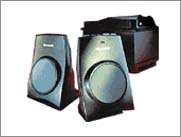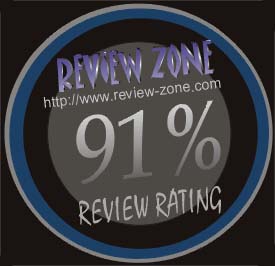Hardware
Audio
Controllers
General
Mainboards
Modems
Monitors
Portables
Printers
Processors
Scanners
Storage
Video
Games
Reviews
Previews
Cheats
& Hints
News
General Info
Oh God, now theyíre here in speaker country. Whatís next? Oil rigs? Dairy products? Will Windows 2001 come with poultry integration for the farmers? OK, OK, enough Microsoft-bashing for the day. Letís get to the (hah!) speakers and try to give it an unbiased review... The Digital Sound System 80 was developed in collaboration with Philips, using their patented wOOx subwoofer technology. Since this is a USB speaker system, Microsoft has included quite a few toys to control the speakers. Just like the Altec Lansing ADA 305, these speakers can be used without a sound card if youíre playing audio CDs, because the audio signal is carried out by the USB and processed by the onboard DSP on the subwoofer. Microsoft deserves credit for the sleek, new age design of the Digital Sound System 80: unlike most other speakers, which are box-like and squat, these 4.8x7.1x4.8 inch satellites are curvy and pleasing to the eye. The 7.3x8.9x12.8 inch, 44W RMS subwoofer is fairly conventional-looking, of course. These speakers can be used in USB (digital) or analog mode. In USB mode, you donít need a sound card to play digital audio, though youíll need one if youíre planning on using it for anything else. The software utilities are available in USB mode, which gives you a ten-band graphic equalizer that comes with the traditional presets. When this product debuted, it was priced at around $200- but for some mysterious reason of their own, Microsoft decided to suddenly drop the price to $110. Of course, when this happened, people naturally assumed there was something drastically wrong with the speakers. But that isnít the case. Microsoft only dropped prices because they wanted the Digital Sound System 80 to give other speaker systems a run for their money. And indeed it does, as we found out when we tested it in comparison with other systems. Music sounds great. Mid-range frequencies are
well-balanced, bass is particularly strong and sound is crisp and clear.
That applies to movie dialogue as well. Just like the Labtec and Bose systems,
the Digital Sound System 80 offered excellent playback for audio CDs.
|
|
|

